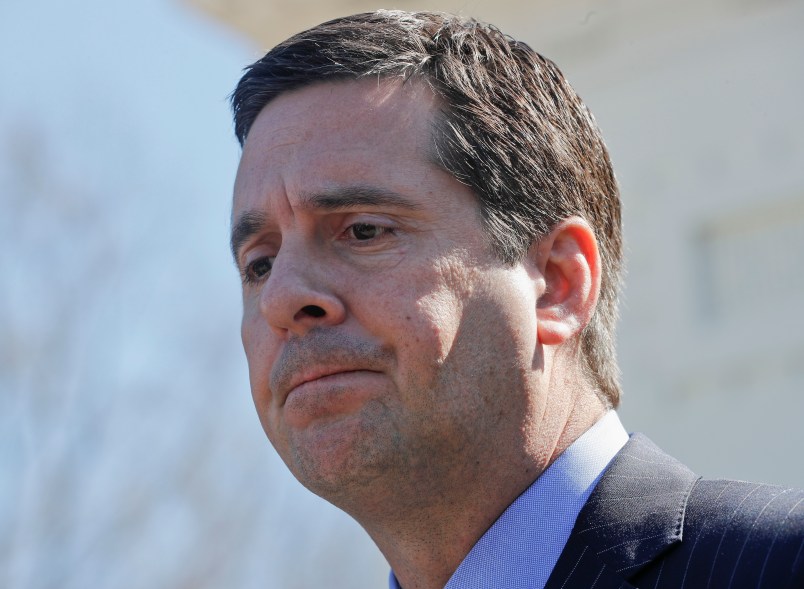As House Republicans prepare to release a four-page memo they claim shows the Justice Department misbehaved in seeking to surveil a Trump campaign adviser, the allegations are already drawing extreme skepticism and outright mockery from former government officials and outside experts.
“None of those pushing this are in any other way acting like they believe what they’re saying,” Julian Sanchez, a senior fellow at the Cato Institute, told TPM.
“You just have this wider and wider net: they all perjured themselves, they all opened themselves to criminal liability,” former FBI counterintelligence agent Asha Rangappa said, referring to the allegations against the FBI. “It makes no sense.”
“It suggests to me that the goal here is not expose a scandal, but the goal is to impugn the credibility of the relevant actors and to satisfy an existing narrative,” said Stephen Vladeck, a University of Texas law professor who specializes in national security issues.
On Monday, Republicans on the House Intelligence Committee voted to release a memo prepared by Chairman Devin Nunes’ committee staff purporting to show the Justice Department abused the FISA process. The President has been given five days to object to its publication, under the obscure House rule Republicans are using to release it, but is reported to be agitating for its release.
According to reports, the memo alleges that the Justice Department acted improperly when seeking a court approval in October 2016 for a FISA warrant to surveil former Trump adviser Carter Page, by not informing the FISA judge that a basis for the warrant, research by ex-British spy Christopher Steele, was being financed by Democrats. The memo comes as GOP lawmakers, led by Trump, have ramped up criticisms of the FBI as Special Counsel Robert Mueller’s Russia investigation heats up.
There are many reasons FISA experts don’t expect the allegations to stand up to the hype, which has involved a Twitter campaign to #ReleaseTheMemo and included GOP claims that what it shows is worse than Watergate.
For Republicans claims of an abuse to be true, one would have to assume that the dossier was the sole basis of the warrant application, that it was a “fabrication” and that the DOJ knew that it was a fabrication when it applied for the FISA warrant, Vladeck said.
“All three things would have to be true for this to actually be an abuse of FISA,” Vladeck said, adding that he wouldn’t take the claims seriously unless the White House declassifies the underlying warrant.
“The major problem here is that this is only arguably scandalous in any way if [the DOJ] just essentially repacked the dossier as a warrant package without any work of their own,” Sanchez said, adding that it would be “inconceivable to me that would be the only source.”
“I doubt they based it on a single source of information,” said a former Republican chair of the House Intel Committee, Mike Rogers, on CNN.
“I can’t imagine that the dossier was the centerpiece of a FISA application,” said Robert Litt, a former general counsel for the Office of the Director of National Intelligence who also worked for the Justice Department.
“Number one, I don’t think the Department of Justice would have allowed that to go forward as the sole basis. Number two, I don’t think a judge would have approved probable cause on that basis alone,” Litt said. “And number three, everything I read has suggested that there was considerable other information about Page before this dossier came in.”
The FISA warrant applications presented to the judge end up being dozens of pages long, according to former officials. A four-page memo that sought to summarize it would be a “carefully picked bowl of cherries,” John McLaughlin, who served as acting CIA director under George W. Bush, said on Twitter.
FISA warrants typically are big thick documents, 50-60 pages. If the Nunes memo about one is just 4 pages, you can bet it’s a carefully picked bowl of cherries. Made all the more dishonest by holding back the minority rebuttal memo. A real debate needs both. Someone fears that.
— john mclaughlin (@jmclaughlinSAIS) January 30, 2018
“Given a lot of stuff that’s already public about Page and about past known attempts to recruit him, it certainly seems like they could well have plenty to go on without the dossier,” Sanchez said.
Court documents filed in 2015 show that the government had intercepted two Russian figures discussing the prospect of recruiting Page, and the FBI interviewed Page in 2013 about his Russian contacts. The Washington Post reported the FISA application cited those communications and others not publicly disclosed. In the spring of 2017, Deputy Attorney General Rod Rosenstein reportedly approved an application to extend the FISA surveillance on Page.
“There would have been probably months, if not years of investigative activity on Carter Page prior to going to the court to begin with,” Rangappa said.
Before a FISA application makes it to the judge, it travels through many layers of review at the FBI that also includes career DOJ lawyers, who verify the source of every fact laid out in the application’s affidavit, according to Rangappa. A warrant for Page would have been treated with extra scrutiny, given the political sensitivities of him having been affiliated with Trump’s campaign, Rangappa said, adding that former FBI Director James Comey would have also likely signed off on it.
“I think a judge would have gone through that with a fine tooth comb and asked many questions,” she said.
Perhaps most frustrating to FISA experts is that it does not appear that the public — or even most lawmakers — will have access to the sort of information that will allow them to fully vet the memo’s claims about the Page FISA warrant. The handful of lawmakers who can see the underlying intelligence will be constrained from talking about it because of its classified nature, though House Democrats are working on releasing their own memo to put Nunes’ in context.










